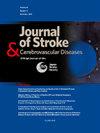Genetic liability to depression and cerebral small vessel disease: A mendelian randomization study
IF 1.8
4区 医学
Q3 NEUROSCIENCES
Journal of Stroke & Cerebrovascular Diseases
Pub Date : 2025-06-24
DOI:10.1016/j.jstrokecerebrovasdis.2025.108385
引用次数: 0
Abstract
Background and Purpose
To investigate the association of genetic liability to depression with cerebral small vessel disease (cSVD).
Methods
Genetic instruments for liability to depression were obtained from a meta-analysis of genome-wide association studies of depression (371,184 cases and 978,703 controls). Mendelian randomization (MR) was used to examine the associations of genetic liability to depression with cSVD clinical outcomes (small vessel stroke [SVS], deep intracerebral hemorrhage [ICH]) and radiographic measures (white matter hyperintensity [WMH] volume, cerebral microbleeds [CMBs], and burden of perivascular spaces [PVS]). The primary analysis was performed using the random-effects inverse-variance weighted method. Sensitivity analyses were conducted to examine the robustness of results to violations of assumptions of MR assumptions.
Results
Genetic liability to depression was associated with a higher risk of SVS (odds ratio [OR], 1.36; 95 % confidence interval [CI], 1.14-1.62; P = 5.4 × 10-4) and deep ICH (OR, 1.82; 95 % CI, 1.14–2.89; P = 0.012). Consistent with this finding, genetic liability to depression was associated with higher WMH volume (β, 0.09; 95 % CI, 0.02–0.16; P = 0.017), but not with CMBs or PVS (P > 0.05).
Conclusions
This study supports a potential causal effect of genetic liability to depression on cSVD. Further investigation is warranted to explore mechanisms and therapeutic implications.
抑郁症和脑血管疾病的遗传易感性:一项孟德尔随机研究
背景与目的探讨抑郁症遗传倾向与脑血管病(cSVD)的关系。方法从抑郁症全基因组关联研究(371184例和978,703例对照)的荟萃分析中获得抑郁症倾向性的遗传工具。采用孟德尔随机化(MR)研究抑郁遗传倾向与cSVD临床结局(小血管卒中[SVS]、深部脑出血[ICH])和影像学指标(白质高强度[WMH]体积、脑微出血[CMBs]和血管周围间隙负担[PVS])之间的关系。采用随机效应反方差加权法进行初步分析。进行敏感性分析以检验结果对MR假设的假设违反的稳健性。结果抑郁的遗传倾向与SVS的高风险相关(优势比[OR], 1.36;95%置信区间[CI], 1.14-1.62;P = 5.4 × 10-4)和深度ICH (OR, 1.82;95% ci, 1.14-2.89;P = 0.012)。与这一发现一致,抑郁症的遗传易感性与较高的WMH体积相关(β, 0.09;95% ci, 0.02-0.16;P = 0.017),但与CMBs或PVS无关(P >;0.05)。结论本研究支持抑郁遗传倾向对心血管疾病的潜在因果影响。有必要进一步研究其机制和治疗意义。
本文章由计算机程序翻译,如有差异,请以英文原文为准。
求助全文
约1分钟内获得全文
求助全文
来源期刊

Journal of Stroke & Cerebrovascular Diseases
Medicine-Surgery
CiteScore
5.00
自引率
4.00%
发文量
583
审稿时长
62 days
期刊介绍:
The Journal of Stroke & Cerebrovascular Diseases publishes original papers on basic and clinical science related to the fields of stroke and cerebrovascular diseases. The Journal also features review articles, controversies, methods and technical notes, selected case reports and other original articles of special nature. Its editorial mission is to focus on prevention and repair of cerebrovascular disease. Clinical papers emphasize medical and surgical aspects of stroke, clinical trials and design, epidemiology, stroke care delivery systems and outcomes, imaging sciences and rehabilitation of stroke. The Journal will be of special interest to specialists involved in caring for patients with cerebrovascular disease, including neurologists, neurosurgeons and cardiologists.
 求助内容:
求助内容: 应助结果提醒方式:
应助结果提醒方式:


